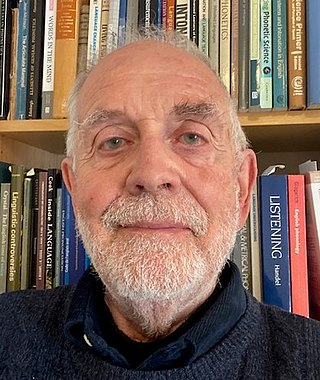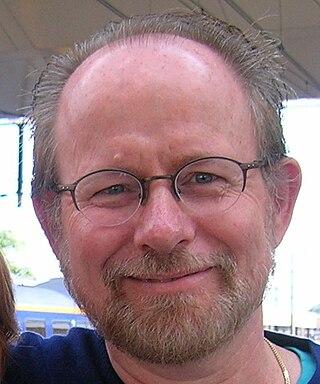Related Research Articles
Phonology is the branch of linguistics that studies how languages systematically organize their phones or, for sign languages, their constituent parts of signs. The term can also refer specifically to the sound or sign system of a particular language variety. At one time, the study of phonology related only to the study of the systems of phonemes in spoken languages, but now it may relate to any linguistic analysis either:

Klas Bernhard Johannes Karlgren was a Swedish sinologist and linguist who pioneered the study of Chinese historical phonology using modern comparative methods. In the early 20th century, Karlgren conducted large surveys of the varieties of Chinese and studied historical information on rhyming in ancient Chinese poetry, then used them to create the first ever complete reconstructions of what are now called Middle Chinese and Old Chinese.

The open back unrounded vowel, or low back unrounded vowel, is a type of vowel sound, used in some spoken languages. The symbol in the International Phonetic Alphabet that represents this sound is ⟨ɑ⟩, and the equivalent X-SAMPA symbol is A. The letter ⟨ɑ⟩ is called script a because it lacks the extra hook on top of a printed letter a, which corresponds to a different vowel, the open front unrounded vowel. Script a, which has a full length linear stroke on its right, should not be confused with turned script a,, which has the linear stroke on its left and corresponds to a rounded version of this vowel, the open back rounded vowel.

Peter Nielsen Ladefoged was a British linguist and phonetician. He was Professor of Phonetics at University of California, Los Angeles (UCLA), where he taught from 1962 to 1991. His book A Course in Phonetics is a common introductory text in phonetics, and The Sounds of the World's Languages is widely regarded as a standard phonetics reference. Ladefoged also wrote several books on the phonetics of African languages. Prior to UCLA, he was a lecturer at the universities of Edinburgh, Scotland and Ibadan, Nigeria (1959–60).
Geoff Lindsey is a British linguist, writer and director. He has written episodes for television series including the BBC soap opera EastEnders and The Bill, and runs a YouTube channel focusing on linguistics.

Praat is a free, open-source computer software package widely used for speech analysis and synthesis in phonetics and other fields of linguistics. It was designed and continues to be developed by Paul Boersma and David Weenink at the University of Amsterdam. Praat is compatible with a wide range of operating systems, including Unix, Linux, Mac, and Microsoft Windows. The software supports formant analysis, pitch extraction, and spectrogram visualization, along with speech synthesis, including articulatory synthesis. Praat has been used in linguistic research on endangered and minority languages, as well as for analyzing regional accents and phonetic variation.
Aditi Lahiri is an Indian-born British linguist and Professor emerita of Linguistics at the University of Oxford. She held the Chair of Linguistics at the University of Oxford from 2007 until her retirement in 2022; she was a Fellow of Somerville College, Oxford. Her main research interests are in phonology, phonetics, historical linguistics, psycholinguistics, and neurolinguistics.
Linguistics is the scientific study of language. The areas of linguistic analysis are syntax, semantics (meaning), morphology, phonetics, phonology, and pragmatics. Subdisciplines such as biolinguistics and psycholinguistics bridge many of these divisions.
Junko Itō is a Japanese-born American linguist. She is emerita research professor of linguistics at the University of California, Santa Cruz.
Jeroen van de Weijer is a Dutch linguist who teaches phonology, morphology, phonetics, psycholinguistics, historical linguistics and other courses at Shenzhen University, where he is Distinguished Professor of English linguistics at the School of Foreign Languages. Before, he was Full Professor of English Linguistics at Shanghai International Studies University, in the School of English Studies.
Carlos Gussenhoven is a professor of linguistics at Radboud University Nijmegen. He specializes in phonetics and phonology.
Patrice (Pam) Speeter Beddor is John C. Catford Collegiate Professor of Linguistics at the University of Michigan, focusing on phonology and phonetics. Her research has dealt with phonetics, including work in coarticulation, speech perception, and the relationship between perception and production.

Peter John Roach is a British retired phonetician. He taught at the Universities of Leeds and Reading, and is best known for his work on the pronunciation of British English.
Jack Windsor Lewis was a British phonetician. He is best known for his work on the phonetics of English and the teaching of English pronunciation to foreign learners. His blog postings on English phonetics and phoneticians are prolific and widely read.

Harry van der Hulst is full professor of linguistics and director of undergraduate studies at the department of linguistics of the University of Connecticut. He has been editor-in-chief of the international SSCI peer-reviewed linguistics journal The Linguistic Review since 1990 and he is co-editor of the series ‘Studies in generative grammar’. He is a Life Fellow of the Netherlands Institute for Advanced Study, and a board member of the European linguistics organization GLOW.

Terrell A. Morgan is an American linguist and professor of Hispanic linguistics at Ohio State University. He is a phonologist and dialectologist specializing in documenting linguistic diversity and developing methods for students, teachers, and other linguists to experience the sounds and structures of Spanish in the real world. His research includes work on phonetic and morphosyntactic variation on topics such as rhotics, voseo, the current usage of vosotros, and pedagogical approaches to phonetics.
Sun-Ah Jun is a Korean-American professor of linguistics at the University of California, Los Angeles.
Alan Stewart Duthie was a Scottish linguist and academic who settled and worked in Ghana all his adult life. He was a pioneer in linguistics at the University of Ghana, Legon, for 49 years.
Mirjam Ernestus is professor of psycholinguistics at Radboud University Nijmegen in the Netherlands.
References
- 1 2 Boersma, Paul (1998). Functional phonology: formalizing the interactions between articulatory and perceptual drives. LOT. ISBN 90-5569-054-6 . Retrieved 12 January 2023.
- ↑ Paul Boersma; Vincent J. van Heuven (2001). "Speak and unSpeak with Praat". Glot International. 5 (9/10): 341–347. ISSN 1381-3439. Wikidata Q117199912.
- ↑ Štefan Benuš (2021). Investigating Spoken English: A Practical Guide to Phonetics and Phonology Using Praat. Palgrave Macmillan. doi:10.1007/978-3-030-54349-5. ISBN 978-3-030-54349-5. Wikidata Q117199913.
- ↑ "Prof. dr. P.P.G. Boersma, 1959". Album Academicum. Retrieved 2024-12-01.
- ↑ "Paul Boersma New LOT Director - LOT". lotschool.nl. Netherlands Graduate School of Linguistics. 3 February 2022. Retrieved 12 January 2023.